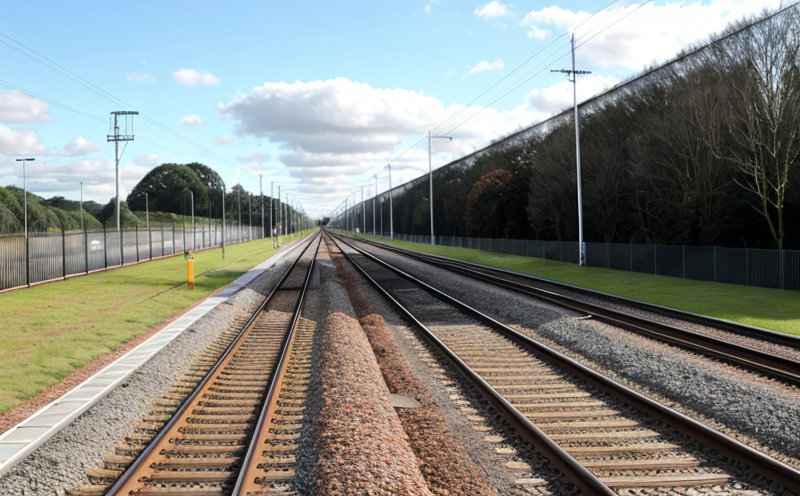EN 1926 Compressive Strength of Ballast Stones
The EN 1926 standard provides a crucial methodology for determining the compressive strength of ballast stones, which are essential components in railway and transportation infrastructure. This test ensures that the ballast stones can withstand the heavy loads and cyclic stresses experienced during train operations. Compliance with this standard is vital to ensure track stability and prevent failures that could lead to accidents or maintenance disruptions.
The compressive strength of ballast stones plays a pivotal role in the overall performance and longevity of railway tracks. Ballast stones act as cushioning elements between rail sleepers, distributing the weight of trains evenly across the track bed. The standard specifies the minimum compressive strength required for these stones to perform their intended function effectively.
The test procedure outlined in EN 1926 involves placing a specimen of ballast stone under compression until it fails. This failure point is measured and reported as the compressive strength. The standard also provides guidance on specimen preparation, which includes selecting representative samples from the batch to be tested. Proper sample selection ensures that the results are reflective of the overall quality of the batch.
The importance of this test cannot be overstated in the context of railway infrastructure. Ballast stones that do not meet the required compressive strength can lead to premature failure, causing disruptions and increasing maintenance costs. By adhering to EN 1926, railway operators and constructors ensure that their ballast stones are reliable and capable of withstanding the rigorous demands placed upon them.
The standard's relevance extends beyond the immediate construction phase; it also impacts long-term operational reliability. Regular testing throughout the lifecycle of a track ensures ongoing compliance with EN 1926, thereby maintaining optimal performance and safety standards.
In summary, the EN 1926 test is fundamental in ensuring the robustness and durability of railway tracks. It plays a critical role in preventing failures that could compromise both operational efficiency and passenger safety. By rigorously adhering to this standard, stakeholders can achieve higher levels of reliability and longevity for their railway infrastructure.
Why It Matters
The importance of the EN 1926 test cannot be overstated in the context of railway and transportation infrastructure. Ensuring that ballast stones meet the required compressive strength is crucial for several reasons:
- Track Stability: Ballast stones provide a stable base upon which rail sleepers are placed. Stones with inadequate compressive strength can shift or break, leading to uneven track surfaces and potential derailments.
- Operational Reliability: Reliable ballast stones ensure that trains run smoothly without interruptions due to track failures. This reliability is essential for maintaining consistent service levels and passenger satisfaction.
- Safety: Structural integrity of the tracks directly impacts safety. Stones that do not meet the required strength can lead to accidents, which could be catastrophic in a high-speed railway environment.
- Maintenance Costs: Ensuring compliance with EN 1926 reduces the need for frequent and costly maintenance interventions by preventing premature failures of ballast stones.
- Longevity: Stones that meet the required compressive strength standards are more durable, extending the lifecycle of railway tracks and reducing replacement costs over time.
In essence, the EN 1926 test is not just a compliance exercise but a proactive measure to ensure safe, reliable, and long-lasting railway infrastructure. It serves as a cornerstone for maintaining high standards in quality management and compliance within the sector.
Scope and Methodology
| Step | Description |
|---|---|
| 1. Sample Preparation: | Select representative samples from the batch to be tested. Ensure that each sample is a typical piece of ballast stone with dimensions as specified in EN 1926. |
| 2. Equipment Setup: | Use a compression testing machine capable of applying controlled loads up to at least the maximum expected load for the specimen's weight. |
| 3. Load Application: | Apply incremental loads to the ballast stone until it fails. Record the applied load and the corresponding deformation or failure point. |
| 4. Data Analysis: | Analyze the data collected during the test to determine the compressive strength of the specimen according to EN 1926 requirements. |
| 5. Reporting: | Document the results, including the measured compressive strength and any deviations from standard criteria. |
The methodology outlined in EN 1926 ensures that each test is conducted under controlled conditions, providing accurate and consistent results. This standardization is critical for maintaining quality control across different batches of ballast stones and ensuring compliance with international norms.
Eurolab Advantages
At Eurolab, we offer comprehensive services that go beyond mere compliance testing. Our team of experts ensures that every aspect of the EN 1926 test is conducted meticulously, providing accurate and reliable results:
- State-of-the-Art Facilities: Equipped with cutting-edge compression testing machines capable of handling a wide range of specimen sizes.
- Experienced Technicians: Our team comprises highly skilled professionals with extensive experience in railway infrastructure testing, ensuring precision and accuracy in every test.
- Comprehensive Reporting: We provide detailed reports that not only meet EN 1926 requirements but also offer insights into potential areas for improvement.
- Customer Support: Our dedicated customer support team is available to assist with any queries or concerns, ensuring a seamless testing process.
- Compliance Expertise: Eurolab's in-depth knowledge of international standards ensures that all tests are conducted according to the latest guidelines and regulations.
By choosing Eurolab for your EN 1926 testing needs, you can be confident in the quality and reliability of your results. We are committed to helping our clients achieve excellence in their railway infrastructure projects.





